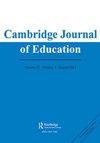Bridging ‘as is’ and ‘as if’ by reading fiction in ethics education
IF 1.5
3区 教育学
Q2 EDUCATION & EDUCATIONAL RESEARCH
引用次数: 0
Abstract
ABSTRACT The overarching aim is to explore what teachers perceive as the opportunities provided by using literature in ethics education in compulsory school. When being interviewed, in what ways do the teachers express views on the potential of fiction to encourage students to accept certain human conditions as imaginable, or to create motivation for ethical change, by means of the capacity of fiction to evoke feelings? Also, in what ways do the teachers interviewed consider fiction to be useful for evoking thoughts about how something could have turned out, in situations that are morally complex? What makes compassion grow within human beings are linked in this article to the concepts as is and as if in play research (cf). Analytical tools are developed and used to explain how, and why, the use of literature is suitable for work with ethics in compulsory school.通过在道德教育中阅读小说,架起“现实”和“假设”的桥梁
本文的主要目的是探讨教师认为在义务教育中使用文学作品所提供的机会。在接受采访时,教师们如何表达小说的潜力,通过小说唤起情感的能力,鼓励学生接受某些可以想象的人类条件,或为道德变革创造动机?此外,受访教师认为小说在哪些方面有助于唤起人们思考,在道德复杂的情况下,事情可能会如何发展?在这篇文章中,是什么让同情心在人类内部成长,与游戏研究中的概念联系在一起(cf)。分析工具的开发和使用,以解释如何,以及为什么,使用文献是适用于工作与道德在义务教育。
本文章由计算机程序翻译,如有差异,请以英文原文为准。
求助全文
约1分钟内获得全文
求助全文
来源期刊

Cambridge Journal of Education
EDUCATION & EDUCATIONAL RESEARCH-
CiteScore
5.30
自引率
4.30%
发文量
35
期刊介绍:
Cambridge Journal of Education publishes original refereed articles on all aspects of education, with a particular emphasis on work that contributes to a shared understanding amongst academic researchers, theorists, practising teachers, policy-makers and educational administrators. The journal also welcomes the submission of systematic review articles that summarise and offer new insights into specific areas of educational concern. With a wide international readership, Cambridge Journal of Education publishes contributions drawn from different educational systems and cultures enabling continued in-depth discussion of global educational theory, policy and practice. The journal’s Special Issue programme encourages and stimulates focused discussion and engagement with significant themes and responses to topics raised by readers and contributors. Cambridge Journal of Education welcomes proposals for future editions.
 求助内容:
求助内容: 应助结果提醒方式:
应助结果提醒方式:


